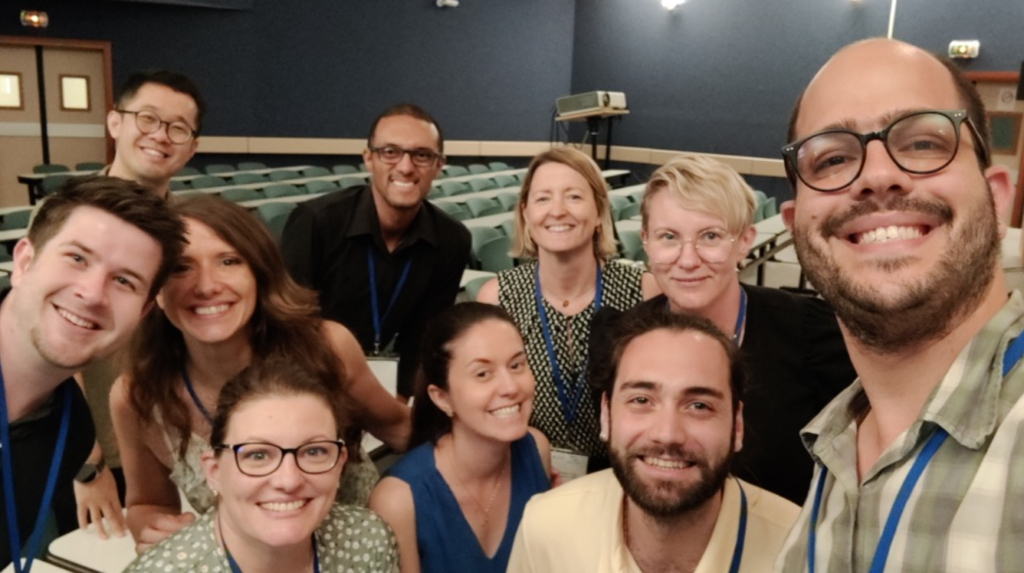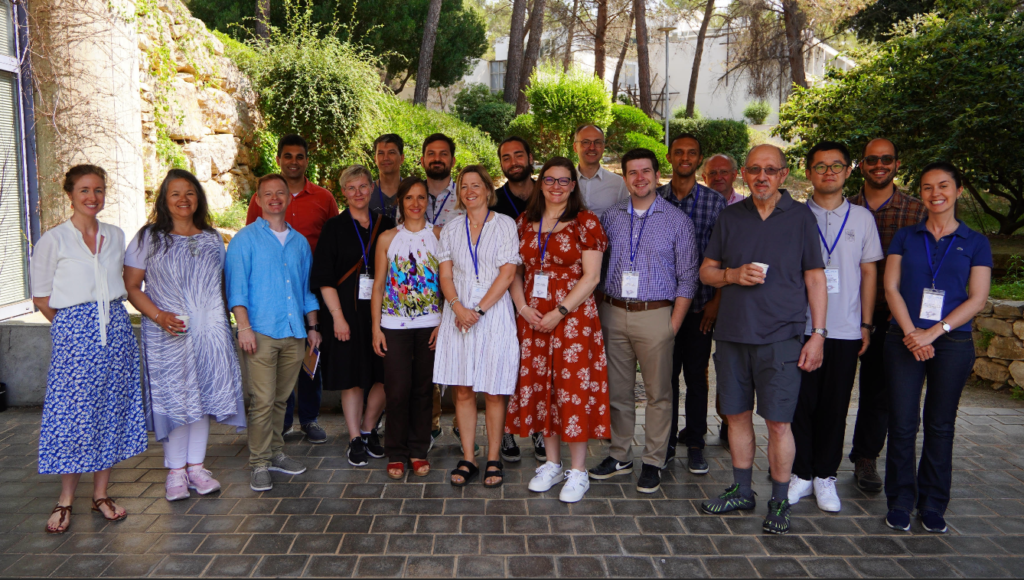The Young Talents Workshop welcomes high-potential Master’s and PhD students whose research aligns with the interests of the Resilience Engineering (REA) community. Topics of interest include adaptive capacity, socio-technical system design, and the modelling or measurement of resilience potential (e.g., FRAM, RAG, etc.). During this one-day event, promising students within the field of Resilience Engineering have the unique opportunity to showcase their work to renowned researchers who serve as mentors in the field.
Participants are chosen based on criteria such as the strength and originality of their research topics, progress in their Master’s or PhD projects, and their aspirations related to the workshop. This year’s candidates not only reflect diversity in terms of gender, with a balanced representation of 50% women and 50% men, but also in their geographical origins, hailing from Asia, Europe, North America, and South America, as depicted in Figure 1. Furthermore, their research domains span various fields, ranging from healthcare and construction to aviation, production, manufacturing, transportation, and crisis management.

The 2023 Young Talents. From left to right: Steven Foster, Peng He, Maria Calero Gonzalez, Christine Jefferies, Ivenio Teixeira de Souza, Mirela Schramm Tonetto, Birte Fagerdal, Francesco Simone, Helene Degerman and Antonio Nakhal.
A Preparatory Virtual Meeting
Consistent with tradition, the Young Talents Workshop took place before the commencement of the REA symposium. However, prior to the workshop, participants had already come together in a virtual gathering. This innovative approach was first introduced by the organising committee during the 2021 edition in response to the challenges posed by COVID-19. For the 2023 workshop, though, candidates and mentors would meet in person!
During a preliminary virtual assembly before the REA symposium, each candidate was asked to deliver a concise three-minute presentation. These presentations served several purposes: to facilitate introductions between participants and foster familiarity with their research topics and to challenge students to distil the essence of their research. Participants received constructive feedback on their presentation style and the questions they intended to pose to their mentors from the organising committee in preparation of the actual workshop.
The Real Thing
On a scorching, sunlit Monday in the southern region of France, the first round of YT presentations took place. After a short introduction by the organising committee, Italy-based students Francesco Simone and Antonio Nakhal kicked off with the presentation of their work. Francesco investigates and develops methods to quantitatively assess resilience in cyber-socio-technical systems, and Antonio focuses on how safety reporting systems are exploited in the complex socio-technical systems to improve their interaction and the capacity to manage changes. Both researchers work with big data approaches such as Machine Learning. Specialised in these approaches, their mentor Ming Yang from Delft University provided valuable feedback on this part of their work. Mentor Erik Vorm (Technical Director at the DARPA EDGE Program) placed an emphasis on the importance to persuade your audience your research should be funded or the importance to adopt your scientific results when presenting your work as a scholar. A valuable lesson for the Young Talents’ future was that producing good data is different from convincingly explaining and selling this data.
Scandinavia-based students Birte Fagerdal and Helene Degerman were up next. Birte disposes of a big experience as a frontline healthcare professional and now studies adaptive capacity in different types of hospital teams. Her mentors were Sudeep Hegde from Clemson University and Tarcisio Saurin from Federal University of Rio Grande do Sul.
Helene also disposes of a big experience as a Human Factors and Systems Safety consultant. Her research focuses on adaptive capacity of public management during the “European refugee crisis of 2015”, in Malmö, Sweden. Her mentors were Tarcisio Saurin and Mike Rayo from Ohio State University.
Interested in understanding how to promote resilient performance in construction projects, Brazilian student Mirela Schramm Tonetto takes into consideration productivity, quality, and reliability. The concept of “making-do” guides an important part of her research. Mike Rayo and Sudeep Hegde were her mentors.
North-America-based student Steven Foster also focuses on sharp-end resilience and aims to understand in what ways physicians adapt their workflows during patient handoffs to balance tradeoffs between stress and workload and patient safety. His mentors were Gesa Praetorius (from the Swedish National Road and Transport Research Institute and University of South-Eastern Norway) and Erik Vorm.
Christine Jefferies, also from the US, uses SCAD to surface and analyse stories of adaptation that might enhance organisational learning both vertically and horizontally in the domains of healthcare and defense acquisition. Her mentors were Riccardo Patriarca from Sapienza University of Rome and Gesa Praetorius.
Peng He, based in China, studies how resilience engineering can affect the civil aviation industry compared to traditional safety management. His mentors were Anthony Smoker from Lund University and Riccardo Patriarca.
The research of Brazil-based Ivenio Teixeira de Souza on FRAM is directed to explore possibilities of extending the applicability of FRAM in quantitative terms. His approach aims to improve its analytical and computational capability which can be useful for the risk and safety management of complex socio-technical systems. His mentors were Elizabeth Lay (Director of Consulting Solutions at Forge Works) and Anthony Smoker.
Spanish PhD candidate Maria Calero Gonzales conducted her research in the domain of the railway industry in England. Her aim is to explore the system’s resilience performance; how the industry as a system, deals with disturbances, uncertainties, and pressures. The research explores ways to bridge Safety-I and Safety-II approaches to safety management (Hollnagel, 2014) by studying ways to increase flexibility in work processes and behaviours without compromising the system’s stability. Her mentors were Elizabeth Lay and Jean-Christophe Le Coze (INERIS)
Wrapping Up
The workshop was sealed off by a dynamic presentation during the REA of the Young Talents on how they experienced the workshop, what they learned and what they took away from it. Important questions that resonated amongst the candidates were: Is RE really needed in your research? What is your career goal? Who is your audience? And the advice: Do you want to finish in time? Kill your darlings.
Once again, the YT workshop has shown to be a sure-value format, allowing young researchers to meet and exchange their experiences, to receive a fresh look upon their work, to be encouraged by others and to hear that enough is maybe enough and that you should start writing up all that you’ve learned in the last couple of years.
As the organising committee, we would like to thank the mentors for spending two full days engaging in fruitful exchanges. A special thanks goes out to the mentors for their flexibility to cover for some flight cancellations, and to Erik Hollnagel for engaging as a special guest in our Young Talents program.
Elleke Ketelaars
Arie Adriaensen

The Young Talents with REA chair Ivonne Herrera, mentors Erik Vorm, Tarcisio Saurin, Sudeep Hegde, Riccardo Patriarca, Anthony Smoker, Erik Hollnagel, and members of the organising committee Arie Adriaensen and Elleke Ketelaars.
Please note that data from the REA Young Talents is now available on our website as well as the latest publications of this year’s participants.
